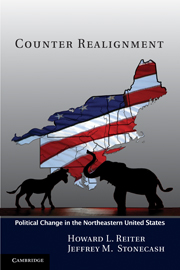Book contents
- Frontmatter
- Contents
- List of Figures
- List of Tables
- Preface
- Acknowledgments
- Postscript: Democratic Fortunes in the Northeast in 2010
- 1 Party Strategies and Transition in the Northeast
- 2 Party Pursuits and the Sources of Change
- 3 The First Republican Losses
- 4 Searching for a Majority, the Rise of Conservatives, and Second Losses
- 5 Interpreting the Goldwater Election and Pursuing the South
- 6 Social Change, Party Response, and Further Republican Losses
- 7 National Parties and the Position of the Northeast
- 8 The Process of Change and the Future
- Index
- References
4 - Searching for a Majority, the Rise of Conservatives, and Second Losses
Published online by Cambridge University Press: 05 June 2012
- Frontmatter
- Contents
- List of Figures
- List of Tables
- Preface
- Acknowledgments
- Postscript: Democratic Fortunes in the Northeast in 2010
- 1 Party Strategies and Transition in the Northeast
- 2 Party Pursuits and the Sources of Change
- 3 The First Republican Losses
- 4 Searching for a Majority, the Rise of Conservatives, and Second Losses
- 5 Interpreting the Goldwater Election and Pursuing the South
- 6 Social Change, Party Response, and Further Republican Losses
- 7 National Parties and the Position of the Northeast
- 8 The Process of Change and the Future
- Index
- References
Summary
OVERVIEW
Beginning with the elections of 1932, Democrats won six of the next eight presidential elections. From 1932 through 1962, Democrats held the majority in the House and for fourteen of sixteen elections they held the Senate. The Republican losses in the 1930s and 1940s created the disagreements within the Republican Party that were discussed in the preceding chapter. Persistent losses also presented the party with the need to reassess their situation in the Northeast. Three issues were important. First, the party had experienced a decline not only outside the Northeast, but also within its northeastern historical base. This diminished support in their historical base suggested that the party had significant problems. Second, even if the party was able to rebuild its strength in the Northeast, the region was slowly declining as a percentage of the nation's population and as a percentage of Republican votes. It was providing fewer Electoral College votes and House seats. Rebuilding support within the region might not pay off enough to make it worthwhile. Third, a conflict was developing about the value of continuing to regard the Northeast, with its relatively more moderate delegation in Congress, as the base of the party. The northeastern wing of the party had been its most conservative up until the 1930s and the staunch core of the party. As noted earlier, Members of Congress from this region began to move to a more moderate position in the 1930s.
- Type
- Chapter
- Information
- Counter RealignmentPolitical Change in the Northeastern United States, pp. 55 - 80Publisher: Cambridge University PressPrint publication year: 2011



